 League Two Carlisle United beat League One Chesterfield 3-1 in extra time at Brunton Park in the Capital One Cup first round.
League Two Carlisle United beat League One Chesterfield 3-1 in extra time at Brunton Park in the Capital One Cup first round.
Jabo Ibehre was the hero for United scoring twice. The first came from a header with just 15 minutes remaining. However, Emmanuel Dieseruvwe levelled for the Spireites to take the game into extra time.
Dieseruvwe though was sent off seconds into extra time for an elbow before Ibehre put the Cumbrians ahead with a right-footed volley.
With time almost up and as Chesterfield pushed for an equaliser, Kevin Osei confirmed victory in injury time with a curling effort
Chesterfield came out of the blocks fastest with Gboly Ariyibi an early threat which resulted in a Spireites corner in the opening minute.
This bright start continued in the opening six minutes as Chesterfield created three great opportunities to take the lead. First, Armand Gnanduillet fired against the post and moments later a second chance fell to captain Sam Morsy who forced Carlisle keeper Mark Gillespie into an excellent save to his left. The last of the trio of efforts on goal for the Spireites saw Gnanduillet round the keeper only to see his goal-bound effort blocked.
At this stage Chesterfield totally dominated the home side and Dan Jones and Ariyibi were combining to great effect.
With ten minutes on the clock Carlisle made their first real threat on the Chesterfield half with Patrick Brough and Steven Rigg combining. Indeed it was this pair who fashioned United’s first chance with Rigg’s header going wide and marked a change in momentum.
Just three minutes later Tommy Lee had to be at his best to save from Rigg and then almost immediately stop an Alexander McQueen attempt on goal.
As the game entered the midway point of the first-half the pace settled with Gnanduillet and Ariyibi continuing to work hard upfront, prompted by Gardner and Jones.
Carlisle though grew in confidence as the half progressed and Chesterfield were grateful to their keeper Lee to keeper out a curling effort from Angelo Balanta on thirty six minutes and from a Grainger free-kick seven minutes later, as the Chesterfield custodian leapt high to palm over the strike.
Even as half-time approached Lee was called into action once more, having to punch away a stinging free-kick from Grainger with Spireites skipper Ian Evatt booked for the initial challenge which conceded the foul.
As in the first-half, Chesterfield started strongly in the second period and Gillespie had to be quickly out to stop Ariyibi as he bore down on goal. Gardner also caused the home team problems from midfield in the opening exchanges.
However, in a repeat of the opening half, Carlisle came into the game and gained in confidence. With McQueen dangerous from the wing, Chesterfield were grateful to see a header from Charlie Raglan drift wide of their own goal.
As the hour mark passed, Carlisle made a double substitution. Charlie Wyke was replaced by Jabo Ibehre and Patrick Brough made way for Kevin Osei. The change proved to be inspired for Carlisle.
Chesterfield continued to press without creating any real opportunities although Jay O’Shea worked hard to drive the Spireites forward at every opportunity.
With twenty minutes to go the pace dropped and Chesterfield made their first change with Gnanduilet replaced by Mani Dieseruvwe.
The deadlock in an entertaining gamed was broken on seventy five minutes as a cross whipped in from the right-hand side was flicked home by Carlisle substitute Ibhere inside Lee’s left-hand post.
With ten minutes left Chesterfield made a change with Ariyibi taken off and Jake Orrell introduced to the action. And it was a case of the substitutes who combined to get the Spireites back in the game with six minutes left.
Orrell worked hard to retain possession and his intelligent ball to his right was swept home by Dieseruvwe for his first senior goal.
Chesterfield finished in the ascendancy but couldn’t fashion a chance as ninety minutes passed or indeed during the four minutes of time added on
Extra-time commenced in explosive fashion as Spireites goal-scorer Dieseruvwe was sent-off with twelve seconds for what appeared to be an elbow.
Carlisle looked to take advantage of the numerical advantage, as two minutes into extra-time Hery drove at the Chesterfield back four before his shot which went high and wide.
In order to provide some fresh legs, Chesterfield made their last change five minutes into extra-time when Banks was replaced by Michael Onovwigun.
However, chances proved to be at a premium in the remainder of the half with Osei having a strike for Carlisle straight at Lee, whilst Jake Orrell worked hard up front on his own for the Spireites.
Two minutes were added on at the end of the first period of extra-time and Osei had the only effort which was easily gathered by Lee during that period for United.
Substitute Osei proved to be a threat at the start of the second period of extra-time with an early shot from within the box which went comfortably wide and also latched onto a through ball which Lee saved bravely at the feet of the Carlisle striker.
This early pressure was the precursor to the Carlisle taking a 2-1 lead as within three minutes of the restart Grainger crossed and Ibehre hooked in his second of the night.
The Spireites responded almost immediately as O’Shea had a shot for Chesterfield which was deflected for a corner just a minute later. Shortly after Gardner had a free-kick opportunity but it was high and wide.
Lee, who was Chesterfield’s man of the match, was in the wars when he dived at the feet of Rigg who earned a booking for his late lunge at the keeper.
Despite being a man down, the Spireites continued to create half-chances as Gardner miskicked from a good position and Morsey had a curling effort just wide.
However, Osei continued to be a threat for United and with the last two minutes of time added on nearly up, he broke down the left and curled into the top corner past the unfortunate Lee and condemn to Chesterfield to a 3-1 defeat.
 2018 marks the 30th year of the William Hill Sports Book Award. The longlist has been announced and is as follows:
2018 marks the 30th year of the William Hill Sports Book Award. The longlist has been announced and is as follows: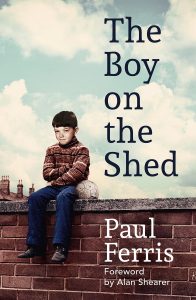 The ‘Beautiful Game’ has had a number of winner’s down the years including Fever Pitch by Nick Hornby in 1992 and the latest in 2015, The Game of Our Lives: The Meaning and Making of English Football by David Goldblatt.
The ‘Beautiful Game’ has had a number of winner’s down the years including Fever Pitch by Nick Hornby in 1992 and the latest in 2015, The Game of Our Lives: The Meaning and Making of English Football by David Goldblatt.
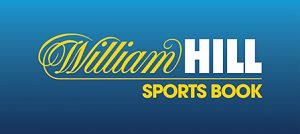 Now in its 28th year, the William Hill Sports Book of the Year Award is the world’s longest established and most valuable literary sports-writing prize.
Now in its 28th year, the William Hill Sports Book of the Year Award is the world’s longest established and most valuable literary sports-writing prize.
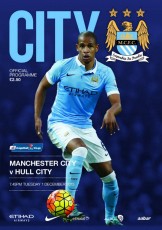 Manchester City moved into what was, pre-sponsorship by Etihad, the City of Manchester Stadium for the start of the 2003/04 season. City had spent 80 years at Maine Road prior to that and fans down the years would have had their pre and post-match rituals down to an art, a tradition passed down the generations – same place, same time, same friends and family.
Manchester City moved into what was, pre-sponsorship by Etihad, the City of Manchester Stadium for the start of the 2003/04 season. City had spent 80 years at Maine Road prior to that and fans down the years would have had their pre and post-match rituals down to an art, a tradition passed down the generations – same place, same time, same friends and family.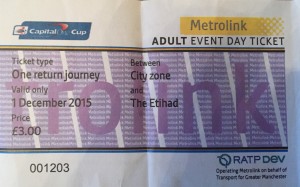 The Etihad Stadium sits to the east of the city centre and is easily reached by tram; tonight a £3 ticket provided a return ticket from Manchester Piccadilly to the Etihad Campus. It was then a short walk up a flight of stairs up to the exterior perimeter of the ground.
The Etihad Stadium sits to the east of the city centre and is easily reached by tram; tonight a £3 ticket provided a return ticket from Manchester Piccadilly to the Etihad Campus. It was then a short walk up a flight of stairs up to the exterior perimeter of the ground. On the pitch, it was Manchester City who triumphed 4-1 over Hull City in a score line which flattered them. When Wilfred Bony slotted home after twelve minutes, one wondered if the game was going to be killed off by the Premier League side quickly. However, despite David Silva making his first start since early October and Belgian international Kevin de Bruyne being in the side, chances were few and far between in a low-key game.
On the pitch, it was Manchester City who triumphed 4-1 over Hull City in a score line which flattered them. When Wilfred Bony slotted home after twelve minutes, one wondered if the game was going to be killed off by the Premier League side quickly. However, despite David Silva making his first start since early October and Belgian international Kevin de Bruyne being in the side, chances were few and far between in a low-key game. The Game of Our Lives: The Meaning and Making of English Football by David Goldblatt has been announced as the winner of the 2015 William Hill Sports Book of the Year.
The Game of Our Lives: The Meaning and Making of English Football by David Goldblatt has been announced as the winner of the 2015 William Hill Sports Book of the Year.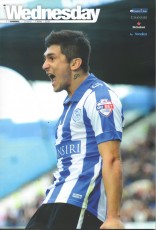 For my last Capital One Cup game at Fulham talk was of how it felt unlike a match-day with a trek across London during rush-hour to witness a game in a ground less than half full.
For my last Capital One Cup game at Fulham talk was of how it felt unlike a match-day with a trek across London during rush-hour to witness a game in a ground less than half full.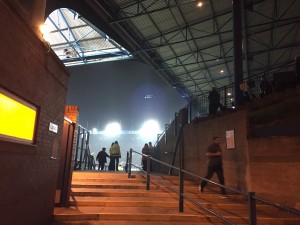 There was a hint of fog in the night sky which swirled in the Hillsborough floodlights and added to the feeling that it might be a night to remember. A quick beer was had and then it was into the Kop, with the crowd, noise and anticipation levels building nicely.
There was a hint of fog in the night sky which swirled in the Hillsborough floodlights and added to the feeling that it might be a night to remember. A quick beer was had and then it was into the Kop, with the crowd, noise and anticipation levels building nicely. Hillsborough was delirious at the half-time whistle with discussions at the break centring on the fact that surely this was a lead that Wednesday couldn’t throw away.
Hillsborough was delirious at the half-time whistle with discussions at the break centring on the fact that surely this was a lead that Wednesday couldn’t throw away.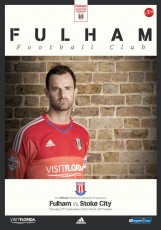 My League Cup adventure had taken me to two new grounds in the previous rounds –
My League Cup adventure had taken me to two new grounds in the previous rounds – 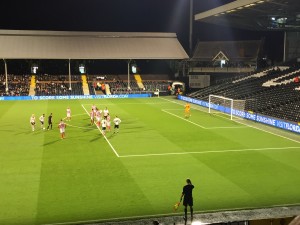 Fulham started brightly in the second period with an early effort from Pringle whistling over the bar. As the half continued, Stoke continued to be resolute at the back, but began to concede a number of free-kicks in and around their penalty box. However, McCormack could not make them count, with his efforts striking the visitors wall.
Fulham started brightly in the second period with an early effort from Pringle whistling over the bar. As the half continued, Stoke continued to be resolute at the back, but began to concede a number of free-kicks in and around their penalty box. However, McCormack could not make them count, with his efforts striking the visitors wall.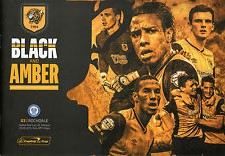 Following a first visit to
Following a first visit to  In terms of my impression of the KC Stadium, it was unspectacular from the outside, as most new-builds are, but it was good to see that had an attempt had been made to break up the plain exterior with a series of fresco’s featuring greats from Hull City and the rugby league legends of Hull FC (who also play at the KC Stadium).
In terms of my impression of the KC Stadium, it was unspectacular from the outside, as most new-builds are, but it was good to see that had an attempt had been made to break up the plain exterior with a series of fresco’s featuring greats from Hull City and the rugby league legends of Hull FC (who also play at the KC Stadium). League Two Carlisle United beat League One Chesterfield 3-1 in extra time at Brunton Park in the Capital One Cup first round.
League Two Carlisle United beat League One Chesterfield 3-1 in extra time at Brunton Park in the Capital One Cup first round.